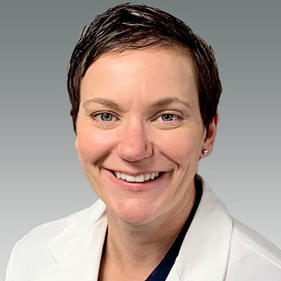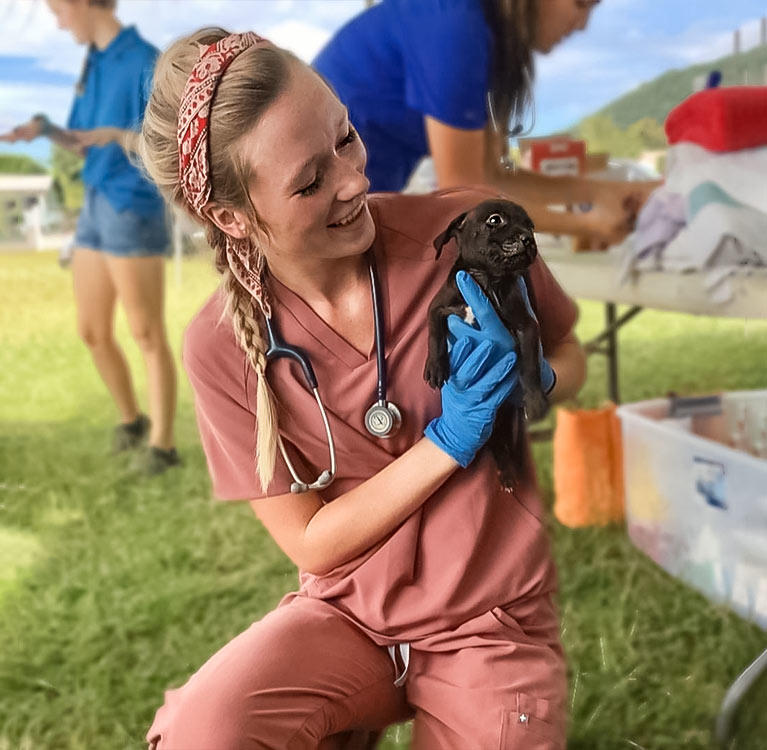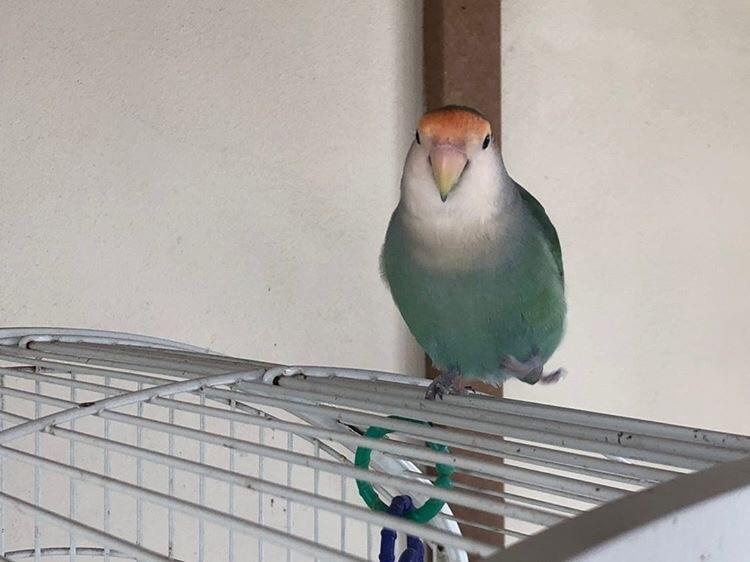Cancer in a beloved pet is heartbreaking. Increasingly, owners are turning to veterinary oncologists for help. Vet oncologists treat cancer to extend and enhance the quality of life of pets. These pet oncologists give peace of mind to owners and compassionate, expert care to pets.
A veterinary oncologist diagnoses and treats animals that have cancer. It is a board-certified specialty of veterinary medicine. Cancer develops in animals just as it does in human beings.
According to American Veterinary Medical Association (AVMA), about 1 in 4 dogs will develop cancer, a rate similar to people. Another similarity is that pet cancer becomes more common as animals age. For dogs that reach the age of 10, half will develop cancer. Veterinary oncologists are less certain about the rate of cancer in cats, but it is likely to be similar, as some cancers are even more common in cats than in dogs. However, a vet oncologist treats cancer in pets besides dogs and cats. Birds, ferrets, lizards, snakes—all these pets can develop cancer.
Veterinary oncologists dedicate their lives to improving remission and cure rates for pet cancer. The vet oncologist is both a healer to the pet and a guide to the owner. Both the owners and the pets need a compassionate healer. If you are passionate about helping pets facing cancer, read on and find out how to become a veterinary oncologist.
HELPING ANIMALS WITH CANCER
Veterinary oncologists treat pet cancer with many of the same methods doctors use to treat cancer in people. These treatments include biologics, chemotherapy, immunotherapy, surgery, and more. A pet oncologist diagnoses the cancer and develops a treatment plan for the pet.
A pet oncologist’s work includes:
- Evaluating the pet’s overall health and clinical condition
- Performing biopsy and laboratory blood work procedures
- Interpreting ultrasound and other radiology scans
- Diagnosing cancer and developing a treatment plan
- Administering chemotherapy or other pharmaceutical interventions
- Managing side effects of chemotherapy interventions
- Surgery to remove neoplasms
- Providing post-operative and recovery care
A vet oncologist may also work as part of a team of specialists, with each providing a different kind of care.
Veterinary oncologists also conduct research to learn about pet cancers and to develop better treatments. Some pet oncologists teach at research universities. Others have a private practice but also contribute to research.
HOW TO BECOME A VETERINARY ONCOLOGIST
To become a veterinary oncologist, students must first earn a Doctor of Veterinary Medicine (DVM) degree by graduating from a veterinary school accredited by the AVMA—such as the Ross University School of Veterinary Medicine (Ross Vet).* Students typically spend three years taking classes in veterinary medicine and then spend a year rotating through various specialties during their clinical year. Veterinarians who practice general medicine can go right into practice after passing the North American Veterinary Licensing Exam. Vets who want to practice animal oncology, however, must go on to complete a residency where they receive specialized training and practice preventing, diagnosing, and treating pet cancer. Finally, the vet oncologist becomes board-certified.
Becoming a veterinary oncologist is challenging and requires commitment to long training. But vet oncologists fill a vital need. Anyone who has ever lost a beloved pet to disease understands how devastating the experience can be. Both the owner and the pet need compassion. By becoming a vet oncologist, you can save lives and relieve suffering in our companions.
MEET A VETERINARY RADIATION ONCOLOGIST
Audrey Stevens, DVM, a 2014 Ross Vet graduate, is a veterinary radiation oncologist and associate medical director at the Veterinary Specialty Hospital of San Diego in California.
Q: What do you wish you had known before you started veterinary school?
Dr. Stevens: I was lucky enough to have a lot of experience working in veterinary hospitals prior to veterinary school including emergency, specialty, and general practice. I would say the one thing I was not as aware of when working as a technician was the amount of work the doctors were doing away from the animals. I spend hours reading records and doing research before I see a patient for the first time. I also spend a lot of time communicating with my clients as well as referring veterinarians by phone and email following the new consultation, during their treatments, and in between recheck exams. I have had to learn to set some boundaries for myself because it is very easy to burn yourself out with the amount of work there is to do.
Q: What is the most rewarding thing about a career in vet oncology?
Dr. Stevens: I think the most rewarding thing about my career as a veterinary radiation oncologist is giving my clients hope following their cancer diagnosis. It can be very overwhelming to receive the bad news that your pet has cancer but not all cancers have a poor prognosis. I enjoy talking to owners about the treatment options that are available for their pet's condition. Treatment options may include surgery, radiation therapy, chemotherapy, immunotherapy, and/ or supportive care.
Even in patients with a poor prognosis there are several things that can be done to improve or maintain a pet's quality of life while they live with cancer. The goal of any veterinary oncologist is to give a pet the best quality of life while they live with their cancer. Many people have their own negative experiences of themselves or loved ones going through chemotherapy or radiation therapy and are afraid to do that to their pet. Luckily dogs and cats experience a much lower rate of side effects than humans.
Q: What is the most challenging thing about being a vet oncologist?
Dr. Stevens: The most challenging thing for any veterinarian is to give their clients bad news. For a veterinary oncologist, this could be telling an owner that we do not have any good treatment options for their pet’s cancer. It can also be difficult to explain to clients that either the cancer has not responded to therapy or progressed despite our best efforts. I always encourage owners to consider euthanasia when a pet's quality of life has declined and supportive medications have not been successful in improving it. For me, the most important part of our veterinary oath is: "...the prevention and relief of animal suffering." In some cases, you know euthanasia is the best option but it may be more difficult to convince the client.
Q: Can you describe a day in the life of a vet oncologist?
Dr. Stevens: As a veterinary radiation oncologist, we start our day around 8 a.m. Our patients undergoing daily treatments are dropped off before 10 a.m. Each patient gets a physical exam before they are anesthetized for their radiation therapy treatments. If a patient is undergoing chemotherapy, then their lab work is drawn at that time. If the owners relayed any questions or concerns to my technicians, then I try to call the owners at that time prior to their treatment if possible. I also check for any emails or phone calls that need to be made prior to starting my appointments for the morning.
I see three new consults in the morning that are each an hour long. This is also sometimes the time when I will be consulting with other specialists in the hospital for patients that they are seeing that may benefit from radiation therapy. A lunch break is scheduled from 12-1 p.m. which is used to catch up on paperwork and catch a quick bite to eat.
The afternoon consists of four recheck exams that are a half hour each. This is also the time when CT scans for radiation therapy planning are performed or when any patient starting radiation therapy will receive their first treatment. After all the patients are treated and discharged for the day, I spend the rest of the day writing records/ discharges, emails, and making phone calls. I also review the records for the new consults for the next day.
Q: Is there anything else you would like to add?
Dr. Stevens: Dogs and cats are luckily living longer because more pets receive preventive medicine. As the pet population aged, cancer became the leading cause of death for our family pets. As technology advances, so do the treatment options available for human and animal cancer patients. I love being a veterinary radiation oncologist because it is an ever changing and exciting field.
Ross Vet provides an accelerated, broad-based curriculum that integrates unique research opportunities, classroom study, and hands-on clinical training. Take the next step on your path to becoming a veterinary oncologist by earing your DVM degree at Ross Vet. Apply for admission today!
Related Links:
*Ross University School of Veterinary Medicine confers a Doctor of Veterinary Medicine (DVM) degree, which is accredited by the American Veterinary Medical Association Council on Education (AVMA COE), 1931 N. Meacham Road, Suite 100, Schaumburg, IL 60173, Tel: 800.248.2862. For more information please visit: https://www.avma.org/education/accreditation-veterinary-colleges.
The AVMA COE uses defined standards to evaluate veterinary medical education programs, including facilities, clinical resources, curriculum, faculty, student outcomes and research programs. The standards are interpreted and applied by the AVMA COE-accredited veterinary medical education programs in relation to its mission.







